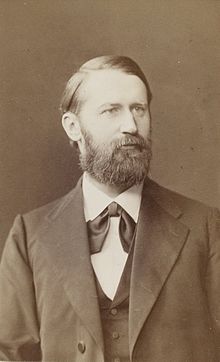Arthur Auwers
| Arthur Auwers | |
|---|---|

Auwers in 1884
|
|
| Born |
September 12, 1838 Göttingen |
| Died | January 24, 1915 (aged 76) Berlin |
| Citizenship | German |
| Fields | astronomy |
Georg Friedrich Julius Arthur von Auwers (September 12, 1838 – January 24, 1915) was a German astronomer. Auwers was born in Göttingen to Gottfried Daniel Auwers and Emma Christiane Sophie (née Borkenstein).
He attended the University of Göttingen and worked at the University of Königsberg. He specialized in astrometry, making very precise measurements of stellar positions and motions. He detected the companion stars of Sirius and Procyon from their effects on the main star's motion, before telescopes were powerful enough to visually observe them. He was from 1866 Secretary to the Berlin Academy, and directed expeditions to measure the transits of Venus, in order to measure the distance from the earth to the Sun more accurately, and therefore be able to calculate the dimensions of the Solar System more accurately and with greater precision. He began a project to unify all available sky charts, an interest that began with his catalog of nebulae which he published in 1862. He died in Berlin. His grave is preserved in the Protestant Friedhof I der Jerusalems- und Neuen Kirchengemeinde (Cemetery No. I of the congregations of Jerusalem's Church and New Church) in Berlin-Kreuzberg, south of Hallesches Tor.
His son Karl von Auwers became a well known chemist and discoverer of the Auwers synthesis.
...
Wikipedia
